Lok Sabha Speaker lauds Ethiopia's strides in Education, Health
By Deepak Arora
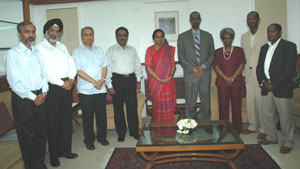 NEW DELHI, Aug 19: The Lok Sabha Speaker, Mrs Meira Kumar, has said that relations between India and Ethiopia are very cordial and the exchange of parliamentary delegations would further strengthen these relations. NEW DELHI, Aug 19: The Lok Sabha Speaker, Mrs Meira Kumar, has said that relations between India and Ethiopia are very cordial and the exchange of parliamentary delegations would further strengthen these relations.
She said this while welcoming a three-member Ethiopian Delegation led by the Speaker of the Council of Nationalities of the Southern Nations, Nationalities and Peoples Regional State of Ethiopia, Mr. Ato Lemo Gezume, which called on her in Parliament House.
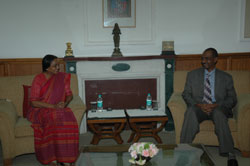 Expressing satisfaction over the impressive progress made by Ethiopia in the field of education and health, Mrs Kumar hoped that similar success would be achieved in other key areas of humanS development. Expressing satisfaction over the impressive progress made by Ethiopia in the field of education and health, Mrs Kumar hoped that similar success would be achieved in other key areas of humanS development.
Responding to the sentiments expressed by Mrs Kumar, Mr. Ato Lemo Gezume thanked India for the assistance provided to Ethiopia and expressed the hope that mutual cooperation between the two countries would be further diversified.
The Ambassador of Ethiopia in India and the Lok Sabha Secretary-General P.D.T. Achary were also present during the Call-on.
Meira congratulates citizens on I-Day
 NEW DELHI, Aug 14: Lok Sabha Speaker Meira Kumar has expressed her best wishes to the fellow citizens on the Independence Day. NEW DELHI, Aug 14: Lok Sabha Speaker Meira Kumar has expressed her best wishes to the fellow citizens on the Independence Day.
In her congratulatory message, Mrs Kumar said: "I congratulate all citizens on the auspicious occasion of the Independence Day. While it is a day that fills our hearts with a sense of patriotism and togetherness, it also reminds us of the supreme sacrifices made by our national leaders during the freedom struggle and, subsequently, during the past six decades, to make India a strong and vibrant nation.
"On this day, let us take a pledge to rededicate ourselves for the promotion of an inclusive society and channelize our efforts to rid our people of all forms of inequities and deprivation."
Remove this caste system: Meira Kumar
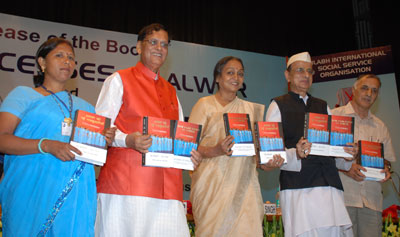 NEW DELHI, Aug 11: Lok Sabha Speaker Meira Kumar on Monday called for total eradication of the caste system so that people belonging to the weaker and marginalised sections could live with self-respect and dignity. NEW DELHI, Aug 11: Lok Sabha Speaker Meira Kumar on Monday called for total eradication of the caste system so that people belonging to the weaker and marginalised sections could live with self-respect and dignity.
“Caste system is the greatest tragedy to befall human race, especially in a country like India that has rich cultural heritage. We need to eradicate this social evil to make a more equitable and just society,” Ms. Kumar said after releasing two books titled New Princesses of Alwar and Alwar Ki Nai Rajkumariyan published by non-governmental organisation Sulabh International.
The books are based on the lives of 56 women scavengers from Alwar in Rajasthan who were liberated and rehabilitated by Sulabh International.
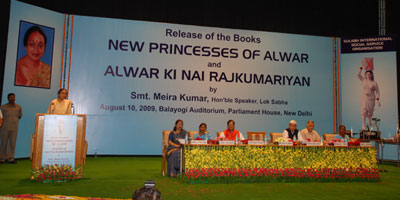 Lamenting that poorest of the poor had felt the impact of the caste system over centuries, Ms. Kumar said, “Nobody, including those belonging to the lowest rung of the social strata, should feel small.” She urged people to come forward to ensure that weaker sections of society joined the national mainstream. Lamenting that poorest of the poor had felt the impact of the caste system over centuries, Ms. Kumar said, “Nobody, including those belonging to the lowest rung of the social strata, should feel small.” She urged people to come forward to ensure that weaker sections of society joined the national mainstream.
The Speaker lauded the role of the Bindeshwar Pathak-led Sulabh International for not only liberating scavengers and providing them other jobs, but also doing service to the nation by providing sanitation facilities across India.
Dr. Pathak rued that scavenging continued in the country despite legislation and the government spending crores on development projects.
“The problem of scavengers is not entirely about sanitation. It is a special problem which calls for special solutions,” he pointed out.
He narrated how 37 liberated women scavengers had won accolades at the United Nations last year where they had gone on special invitation.
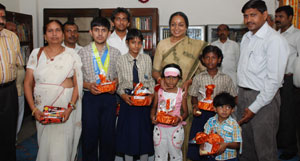 Meira Kumar celebrates Rakhi with differently-abled children Meira Kumar celebrates Rakhi with differently-abled children
NEW DELHI, Aug 5: Lok Sabha Speaker Meira Kumar on Wednesday celebrated Raksha Bandhan, a festival that marks the bond of love between siblings, with a group of mentally challenged, and hearing and speech impaired children here.
"The feeling of brotherly love and affection should flourish all around, especially among children," the Speaker said while celebrating the festival with children from the Aastha Special School in Bhiwadi, Rajasthan, at her official residence here.
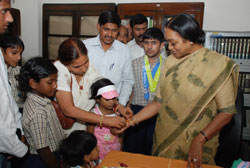 On the occasion, a sister usually ties a rakhi (thread) on her brother's wrist and in turn he gives her gifts and vows to protect her. On the occasion, a sister usually ties a rakhi (thread) on her brother's wrist and in turn he gives her gifts and vows to protect her.
But it was Meira Kumar to whom a mentally challenged child tied rakhi on Wednesday.
The speaker later distributed gifts among the special children.
Education is now a fundamental right in India
NEW DELHI, Aug 4: Parliament has adopted ‘The Right of Children to Free and Compulsory Education Bill, 2009,’ which envisages free and compulsory education to children in the 6-14 age group with the Lok Sabha approving it by voice vote on Tuesday. The Rajya Sabha passed the Bill on July 20.
Replying to the debate, Human Resource Development Minister Kapil Sibal termed the Centre’s move a “national enterprise that would help shape India’s future.” The legislation would ensure every child’s right to education, and the obligation of the government to impart it. Once the President gave assent to the Bill, getting education would be a fundamental right of the child.
The law was brought not to interfere with the State government’s attempts to provide elementary education. On the medium of instruction, he said there was a provision to provide elementary education, as far as possible, in the mother tongue of the child. The law would ensure that the child got free, compulsory and quality education by qualified teachers.
The curriculum would be less rigorous and it would ensure all-round development of children.
While 25 per cent of seats in every private school would be allocated for children from disadvantaged groups including differently-abled children at the entry level, as far as minority institutions were concerned up to 50 per cent of those seats could be offered to students from their communities.
Stressing the need for a big boost to children’s education, Mr. Sibal said that out of every 100 children attending elementary school only 12 reached the graduation level; in Europe it was 50-70 (students reaching college from the elementary level) and the global average 27. The Centre wanted to increase India’s average to 15 by 2012 and to 30-35 by 2020, he said.
On infrastructure, he said there was a provision for establishing recognition authority in every State under which all schools would have to fulfil the minimum requirement of infrastructure within three years.
Otherwise, they would lose recognition. Similarly appointment of teachers had to be approved by the academic committee, he pointed out.
Bill on declaration of judges' assets deferred
NEW DELHI, Aug 3: The government on Monday deferred the introduction of a bill on the declaration of judges' assets after members across the spectrum said in the Rajya Sabha that it violated the Constitution and the Right to Information Act.
"In view of the sentiments expressed by the members and to build consensus on the issue, I am deferring the introduction of the bill," Law Minister Veerappa Moily said, as member after member, including Jayanti Natarajan of the ruling Congress, objected to clause six of the Judges (Declaration of Assets and Liabilities) Bill 2009 under which the assets of judges could not be made public.
Opposing the introduction of the bill after Moily sought permission to do so, Leader of Opposition Arun Jaitley (Bharatiya Janata Party) said: "Under clause six, a judge has to declare his assets to a competent authority and this cannot be made public.
"If I want to contest an election, I have to first declare my assets and these are made public. Thus, clause six seeks to give a different interpretation to article 19 of the constitution. We can't have two interpretations of the same article."
"We can't have dual interpretations of the law for people seeking to hold public office and those already occupying public office," he added.
Jaitley also objected to the fact that the bill had been "circulated among the judiciary and has been drafted on the basis of their recommendations". Moily, however, contested this.
Jurist Ram Jethmalani termed the bill a "conspiracy of corruption". "This bill will make the judiciary subservient to the executive," he contended.
President, PM, Speaker condole passing away of Gayatri Devi
NEW DELHI, July 30: President Pratibha Devisingh Patil, Prime Minister Manmohan Singh, Lok Sabha Speaker Meira Kumar and several other political leaders have condoled the passing away of Shrimati Gayatri Deviji.
In a condolence message to the family members of Gayatri Deviji, the President has said, “I am deeply saddened to hear about the passing away of Shrimati Gayatri Deviji. She was a multi-faceted personality, who made a deep impression on account of her work in public life, culture and art. She was a parliamentarian and a pioneer in the field of women’s education, an issue to which she was deeply committed. In her passing away, the nation has lost a reputed and a well known personality of national stature”.
In his condolence message, the Prime Minister described Gayatri Devi, popularly known as Rajmata, as a close friend and an exceptional human being.
Gayatri Devi entered politics in 1960s and was elected to the Lok Sabha for three terms. In her public life she worked with devotion for the socio-economic development of her people. She was an international celebrity, named in a list of the ten most beautiful women of her times. She contributed substantially to the cause of the uplift of the girl child. She also promoted the dying art of blue pottery in Rajasthan.
“I convey my heartfelt condolences to her family and friends. I pray for peace of the departed soul,” Dr Singh said.
In her condolence message, Lok Sabha Speaker Meira Kumar said that Gayatri Devi was a distinguished Member of Parliament and an exemplary human being who contributed purposively to the cause of national development. More notably, she championed the cause of empowerment of women and weaker sections. Women’s education was very close to her heart. Smt. Kumar conveyed her heartfelt condolences to the bereaved family of Rajmata Gayatri Devi.
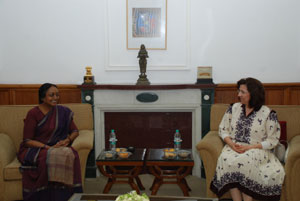 Romanian Ambassador calls on LS Speaker Romanian Ambassador calls on LS Speaker
NEW DELHI, July 31: The Ambassador of Romania, Mrs. Valerica Epure, called on Lok Sabha Speaker, Mrs Meira Kumar, in Parliament House on July 30.
The two discuss issues of international importance.
Sonia backs PM over Indo-Pak joint statement
 NEW DELHI, July 30: Congress President Sonia Gandhi today strongly backed Prime Minister Manmohan Singh on the issue of the Indo-Pak joint statement and told partymen that there should be no confusion or misunderstanding on it among them. NEW DELHI, July 30: Congress President Sonia Gandhi today strongly backed Prime Minister Manmohan Singh on the issue of the Indo-Pak joint statement and told partymen that there should be no confusion or misunderstanding on it among them.
She also said that India’s foreign policy vis-a-vis Pakistan has not changed.
“Till Pakistan shows concrete steps on anti-terror front there is no point of dialogue,” she told a Congress Parliamentary Party meeting here, a day after the Prime Minister addressed Parliament on the issue of the joint statement with Pakistan in Egypt.
Resumption of dialogue with Pakistan depends upon whether it fulfills its promises on taking action against perpetrators of Mumbai attacks and does not allow its soil to be used for terror activities against India, Congress spokesperson Manish Tewari quoted Gandhi as saying in the meeting.
Those who attended the CPP meeting included the Prime Minister, Leader of the Lok Sabha Pranab Mukherjee, Cabinet ministers and over 200 MPs.
At the meeting, Gandhi stressed on the need for fulfilling the commitments made by the party to the people during the elections.
She also asked the ministers to give attention to the problems of party workers and the aspirations of the people in their constituencies.
Manmohan Pak policy: Trust, but verify
 NEW DELHI, July 29: Prime Minister Manmohan Singh on Wednesday asserted that the government had not diluted its position on terrorism by issuing a joint statement with Pakistan earlier this month but left the door open for dialogue provided Pakistan fulfilled its commitment in “letter and spirit” to root out anti-India terrorist activity from its soil. NEW DELHI, July 29: Prime Minister Manmohan Singh on Wednesday asserted that the government had not diluted its position on terrorism by issuing a joint statement with Pakistan earlier this month but left the door open for dialogue provided Pakistan fulfilled its commitment in “letter and spirit” to root out anti-India terrorist activity from its soil.
Intervening in a debate in the Lok Sabha on issues arising from his recent visits abroad, the Prime Minister underlined the need for engagement with Pakistan to achieve enduring peace in the subcontinent and slammed the “enemies of peace” for trying to make alienation between the two countries permanent and the divide unbridgeable.
Speaking to a packed House and backed by animated party members and allies, the Prime Minister rejected third party involvement in talks with Pakistan because of its limited effectiveness. It could also lead to longer-term involvement of foreign powers in South Asia which is “not something to our liking.”
Tracing the highs and lows of India-Pakistan ties during his much-awaited intervention, the Prime Minister said India would follow a policy of “trust and verify” on commitments by Pakistan, and revealed that the impetus to the joint statement came from the dossier submitted by Islamabad a few days before he left for France and Egypt. The dossier showed that some progress had been made by Pakistan but India did not think it was “adequate” for resumption of a full-fledged dialogue. The joint statement also took a step forward by committing both countries to sharing real time, credible information to prevent any attack in future.
At the same time, the Pakistani leadership was told to ensure that Mumbai-type attacks were not repeated and another such attack would put an “intolerable strain on our relationship.” Dr. Singh thought the current Pakistani leadership understood the need for action against terrorists of all hues and cautioned that Pakistan would be “consumed” if it did not resolutely counter terror.
The dialogue would now be limited to Foreign Secretary-level capped in the near term by a meeting between the two Foreign Ministers on the sidelines of the United Nations General Assembly in New York.
Dr. Singh acknowledged the statesmanship of the former Prime Minister, Atal Bihari Vajpayee, in pursuing the course of dialogue despite several setbacks. But he pointed out that despite the National Democratic Alliance government’s “tall talk” it was unable to get Pakistan to probe the involvement of its nationals in previous terror attacks. “So the UPA government needs no lessons from the Opposition on how to conduct foreign affairs or secure our nation from terrorist attacks,” he said to enthusiastic thumping of desks from the ruling alliance benches.
Responding to criticism over the incorporation of Balochistan in the joint statement, Dr. Singh said New Delhi was willing to discuss strife in the Pakistani province because it had clean hands and was willing to remove any misgivings. Far from being engaged in fomenting discontent in Pakistan, Indian consulates in Afghanistan were focussing on the large-scale reconstruction work being carried out in the country. “But we were willing to discuss all these issues because we are doing nothing wrong,” Dr. Singh maintained.
Excerpts from Prime Minister Manmohan Singh’s intervention in the Lok Sabha on July 29, 2009 during a debate on his recent foreign tours:
Madam Speaker,
As I have said many times before, we cannot wish away the fact that Pakistan is our neighbour. We should be good neighbours. If we live in peace, as good neighbours do, both of us can focus our energies on the many problems – our abject poverty that confront millions and millions of people in South Asia. If there is cooperation between us, and not conflict, vast opportunities will open up for trade, travel and development that will create prosperity in both countries.
It is, therefore, in our vital interest to make sincere efforts to live in peace with Pakistan. But despite the best of intentions, we cannot move forward if terrorist attacks launched from Pakistani soil continue to kill and injure our citizens, here and abroad. That is the national position. I stand by it.
I have said time and again and I repeat it right now again: it is impossible for any government in India to work towards full normalisation of relations with Pakistan unless the Government of Pakistan fulfils, in letter and spirit, its commitment not to allow its territory to be used in any manner for terrorist activities against India.
This was a commitment made as my friend Shri Yashwant Sinha has mentioned to my distinguished predecessor Shri Atal Bihari Vajpayee, and it has been repeated to me in every meeting I have had with the Pakistani leadership. The people of India expect these assurances to be honoured and this government recognizes that as the national consensus.
Madam Speaker,
The attack on Mumbai last November outraged our nation and cast a deep shadow over our relations with Pakistan. The reality and the horror of it were brought into Indian homes over three traumatic days that still haunt us. The people of India demand that this must never happen again.
Over the past seven months, we followed a policy, using all effective bilateral and multilateral instruments at our command, to ensure that Pakistan acts, with credibility and sincerity, as we would expect of any civilised nation.
Soon after the attacks, the United Nations Security Council imposed sanctions on the Lakshar-e-Taiba and its front organisations, including the Jamaat-ud-Dawa. It also imposed sanctions on four individuals connected with the organisation, including one of the masterminds behind the Mumbai attacks, Zaki-ur-Rehman Lakhvi.
We exercised great restraint under very difficult circumstances but made it clear that Pakistan must act. On 5th January 2009, we handed over to Pakistan the details of the links to Pakistan that were revealed by our investigators. Some action followed and Pakistan formally responded to us on two occasions regarding the progress of their own investigations — in February 2009 and then just two days before my departure for Paris and Sharm-el-Sheikh.
The latest dossier is a 34-page document that gives details of the planning and sequence of events, details of the investigations carried out by the special Federal Investigation Agency team of Pakistan, a copy of the FIR lodged and the details and photographs of the accused in custody and those declared as proclaimed offenders. It provides details of the communication networks used, financing of the operation and seizures made in Pakistan including maps, lifeboats, literature on navigational training, intelligence manuals, backpacks, etc.
The Pakistan dossier states that the investigation has established beyond doubt that LeT activists conspired, financed and executed the attacks. Five of the accused have been arrested, including Zaki-ur-Rehman Lakhvi and Zarar Shah, and thirteen others have been declared proclaimed offenders. A charge sheet has since been filed against them under Pakistan’s Anti Terrorism Act and other relevant laws. We have been told that the investigations are nearly complete and that the trial will now proceed. We have also been asked for some further information. We will provide this shortly.
This is the first time that Pakistan has ever formally briefed us on the results of an investigation into a terrorist attack in India. It has never happened before and I repeat this is the first time. It is also the first time that they have admitted that their nationals and a terrorist organisation based in Pakistan carried out a ghastly terrorist act in India.
Madam Speaker,
The reality is that this is far more than the NDA government was ever able to extract from Pakistan during its entire tenure despite all their tall talk. They were never able to get Pakistan to admit what they have admitted now. So the UPA government needs no lessons from the opposition on how to conduct foreign affairs or secure our nation against terrorist threats.
But while noting the steps Pakistan has taken, I have to say that they do not go far enough. We hope that the trial will make quick progress and that exemplary punishment will be meted out to those who committed this horrific crime against humanity. We need evidence that action is being taken to outlaw, disarm and shut down the terrorist groups and their front organisations that still operate on Pakistani soil and which continue to pose a grave threat to our country.
Madam Speaker,
In the final analysis, the reality is that, despite all the friends we have, and we should have as many friends as Shri Mulayam Singh ji has said, when it comes to matters relating to our national security and defence, we will have to depend on ourselves. Self-help is the best help. There is no substitute to strengthening our defence capabilities, our internal security structures and our emergency response mechanisms. I wish to assure the House that the government is giving these matters the highest priority and attention.
Several important steps have been taken to modernise, rationalise and strengthen our defence, security and intelligence apparatus. A detailed plan to address internal security challenges is being implemented in a time-bound manner. The government is maintaining utmost vigil in the area of internal security. Measures have been taken to ensure enhanced information and intelligence sharing on a real time basis. A policy of zero-tolerance towards terrorism, from whatever source it originates, has been put in place.
In the area of defence, steps are under way to substantially improve our coastal and maritime security. Large acquisitions of major weapon systems and platforms have been approved for the modernisation of our Army, Navy and Air Force. There has been a special focus to improve the welfare of the Armed Forces personnel.
We will spare no effort and no expense to defend our nation against any threat to our sovereignty, unity and integrity. This is the sacred and bounden duty of any government of this great country.
Madam Speaker,
We do not dilute our positions or our resolve to defeat terrorism by talking to any country. Other major powers affected by Pakistan-based terrorism are also engaging with Pakistan. Unless we talk directly to Pakistan, we will have to rely on third parties to do so. That route, I submit to this August House, has very severe limitations as to its effectiveness, and for the longer term the involvement of foreign powers in South Asia is not something to our liking.
I say with strength and conviction that dialogue and engagement is the best way forward.
This has been the history of our relations with Pakistan over the last decade. Shri Atal Bihari Vajpayee took a decision of political courage to visit Lahore in 1999. Then came Kargil and the hijacking of an Indian Airlines plane to Kandahar. Yet, he invited General Musharraf to Agra and again tried to make peace. The nation witnessed the terrible attack on Parliament in 2001. There followed an extremely difficult phase in our relationship. The armed forces of the two countries stood fully mobilised.
But, to his great credit, Shri Vajpayee was not deterred, as a statesman should not be. In 2004, he went to Islamabad, where a Joint Statement was issued that set out a vision for a cooperative relationship. I must remind the House that opposition parties supported these bold steps. I, for one, share Shri Vajpayee’s vision, and I have also felt his frustration in dealing with Pakistan.
In my meetings with President Zardari in Yekaterinburg and with Prime Minister Gilani in Sharm-el-Sheikh, I conveyed, in the strongest possible terms, our concerns and expectations. I conveyed to them the deep anger and hurt of the people of India due to the persistence of terrorist attacks in India.
I told them that the operations of all terrorist groups that threaten India must end permanently. I urged them to make no distinctions between different terrorist organisations. I said that it was not enough to say that Pakistan is itself a victim of terrorism. They must show the same political will and take the same strong and sustained action against terrorist groups operating on their eastern border as they now seem to be taking against groups on their western border.
Both President Zardari and Prime Minister Gilani assured me that the Pakistan government was serious and that effective action would be taken against the perpetrators of the Mumbai carnage.
Shri Yashwant Sinha asked me what had changed between my meeting with President Zardari and the meeting with Prime Minister Gilani. In between came the dossier which showed progress though not adequate progress. Shri Sinha also asked me do we trust Pakistan. Let me say that in the affairs of two neighbours we should recall what President Reagan once said – trust but verify. There is no other way unless we go to war.
I was told that Mumbai was the work of non-state actors. I said that this gave little satisfaction and that it was the duty of their government to ensure that such acts were not perpetrated from their territory. I told them that another attack of this kind will put an intolerable strain on our relationship and that they must take all possible measures to prevent a recurrence.
Madam Speaker,
After I returned from Sharm-el-Sheikh, I made a statement in Parliament, which clarified and elaborated not just the Joint Statement issued following my meeting with Prime Minister Gilani, but also what we discussed.
I wish to reiterate that the President and the Prime Minister of Pakistan know, after our recent meetings, that we can have a meaningful dialogue with Pakistan only if they fulfil their commitment, in letter and spirit, not to allow their territory to be used in any manner for terrorist activities against India. This message was repeated when the Foreign Ministers and Foreign Secretaries met.
I stand by what I have said in Parliament — that there has been no dilution of our position in this regard.
An interpretation has been sought to be given to the Joint Statement that we will continue to engage in a composite dialogue whether Pakistan takes action against terrorism or not. This is not correct. The Joint Statement emphasised that action on terrorism cannot be linked to dialogue. Pakistan knows very well that with terrorism being such a mortal and global threat, no civilised country can set terms and conditions for rooting it out. It is an absolute and compelling imperative that cannot be dependent on resumption of the composite dialogue. In the Joint Statement itself, the two sides have agreed to share real time, credible and actionable information on any future terrorist threats.
Madam Speaker,
When I spoke to Prime Minister Gilani about terrorism from Pakistan, he mentioned to me that many Pakistanis thought that India meddled in Balochistan. I told him that we have no interest in destabilising Pakistan nor do we harbour any ill intent towards Pakistan. We believe that a stable, peaceful and prosperous Pakistan living in peace with its neighbours is in our own interest.
I told him then, and I say it here again, that we are not afraid of discussing any issue of concern between the two countries. If there are any misgivings, we are willing to discuss them and remove them.
I said to him that I had been told by the leadership of Pakistan several times that Indian Consulates in Afghanistan were involved in activities against Pakistan. This is totally false. We have had Consulates in Kandahar and Jalalabad for 60 years. Our Consulates perform normal diplomatic functions and are assisting in the reconstruction of Afghanistan, where we have a large aid programme that is benefiting the common people of Afghanistan.
But we are willing to discuss all these issues because we know that we are doing nothing wrong. I told Prime Minister Gilani that our conduct is an open book. If Pakistan has any evidence, and they have not given me any and no dossier has been given, we are willing to look at it because we have nothing to hide.
Madam Speaker,
I believe that it is as much in Pakistan’s vital interest as it is in ours to make peace. Pakistan must defeat terrorism, before being consumed by it. I believe the current leadership there understands the need for action.
I was told by the parliamentarians who accompanied Prime Minister Gilani that there is now a political consensus in Pakistan against terrorism. That should strengthen the hands of its leaders in taking the hard decisions that will be needed to destroy terrorism and its sponsors in their country.
Madam Speaker,
Our objective, as I said at the outset, must be a permanent peace with Pakistan, where we are bound together by a shared future and a common prosperity.
I believe that there is a large constituency for peace in both countries. The majority of people in both countries want an honourable settlement of the problems between us that have festered far too long and want to set aside the animosities of the past. We know this, but in the past there have been hurdles in a consistent pursuit of this path. As a result, the enemies of peace have flourished. They want to make our alienation permanent, the distance between our two countries an unbridgeable divide. In the interests of our people, and in the interest of peace and prosperity of South Asia, we must not let this happen.
That is why I hope and pray that the leadership in Pakistan will have the strength and the courage to defeat those who want to destroy, not just peace between India and Pakistan, but the future of South Asia. As I have said before, if they show that strength and that courage, we will meet them more than half way.
There are uncertainties on the horizon, and I cannot predict the future in dealing with neighbours, two nuclear powers. We have to begin to trust each other, but not blindly, but trust and verify. People say that we have broken the national consensus. I refuse to believe that we have broken the national consensus.
For the present we have agreed that the Foreign Secretaries will meet as often as necessary and report to the two Foreign Ministers who will meet on the sidelines of the United Nations General Assembly. The two Foreign Ministers have met even before the Joint Statement in Trieste. I met President Zardari in Russia. So in operational terms the effect of the Statement that the two Foreign Secretaries will meet as often as necessary followed by the Foreign Ministers is no more than what we are doing at present. Does it involve surrender or a sign of weakness?
As neighbours it is our obligation to keep our channels open. Look at what is happening in the world. The US and Iran have been sworn enemies for thirty years, and yet they feel compelled to enter into a dialogue. Unless we want to go to war with Pakistan, dialogue is the only way out. But we should do so on the basis of trust but verify.
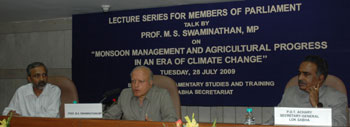 Swaminathan talks on monsoon management and agriculture progress Swaminathan talks on monsoon management and agriculture progress
NEW DELHI, July 28: Prof. M.S. Swaminathan, M.P., delivered a talk on “Monsoon Management and Agricultural Progress in an era of Climate Change” at the Parliament House on Tuesday.
 The lecture was part of series for MPs, organized by the Bureau of Parliamentary Studies and Training of the Lok Sabha Secretariat. The lecture was part of series for MPs, organized by the Bureau of Parliamentary Studies and Training of the Lok Sabha Secretariat.
Several members of Parliament attended the lecture.
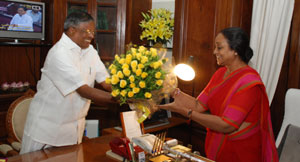 Tamil Nadu Speaker calls on Lok Sabha Speaker Tamil Nadu Speaker calls on Lok Sabha Speaker
NEW DELHI, July 28: Speaker of Tamil Nadu Legislative Assembly R. Avudaiappan called on Lok Sabha Speaker Meira Kumar in Parliament House on Tuesday.
He also met Lok Sabha Secretary General P.D.T. Achary in Parliament House.
LS passes Finance Bill for 2009-10 with some amendments
NEW DELHI, July 27: The Lok Sabha has passed the Finance Bill for 2009-10 by a voice vote on Monday, Finance Minister Pranab Mukherjee has said that economic recovery has begun and India would achieve 8-9 pc economic growth by the end of 2010.
Finance Minister Pranab Mukherjee has announced a slew of concessions, including one pc interest subsidy for lower and middle income housing loans, and exempted road repair and maintenance services from the ambit of service tax.
Replying to the debate on the Finance Bill 2009, which was passed with some amendments in the Lok Sabha on Monday, he also announced that the service tax on new services proposed in his Budget would come into effect from 1st September.
Maintaining that lower and middle income housing deserves to be supported to stimulate this segment of house owners, Mukherjee said one percent interest subsidy would be available to individuals for loans up to Rs 10 lakhs for houses that do not cost more than Rs 20 lakhs. He proposed to provide Rs 1,000 crore for this purpose.
Giving yet another sop, the Minister said that the eligible deductions for assessees with severe disability will be raised from Rs 75,000 to Rs 1 lakh for purposes of Income Tax.
The Minister also extended the benefit of deductions in respect of interest paid on education loan for higher education to legal guardian of the student under Section 80E of the IT Act.
Similarly, he extended the sunset clause for tax holidays for industrial parks by another two years up to March 2011, in a bid to provide stimulus to infrastructure sector in the wake of economic slowdown.
|

 NEW DELHI, Aug 19: The Lok Sabha Speaker, Mrs Meira Kumar, has said that relations between India and Ethiopia are very cordial and the exchange of parliamentary delegations would further strengthen these relations.
NEW DELHI, Aug 19: The Lok Sabha Speaker, Mrs Meira Kumar, has said that relations between India and Ethiopia are very cordial and the exchange of parliamentary delegations would further strengthen these relations.  Expressing satisfaction over the impressive progress made by Ethiopia in the field of education and health, Mrs Kumar hoped that similar success would be achieved in other key areas of humanS development.
Expressing satisfaction over the impressive progress made by Ethiopia in the field of education and health, Mrs Kumar hoped that similar success would be achieved in other key areas of humanS development. NEW DELHI, Aug 14: Lok Sabha Speaker Meira Kumar has expressed her best wishes to the fellow citizens on the Independence Day.
NEW DELHI, Aug 14: Lok Sabha Speaker Meira Kumar has expressed her best wishes to the fellow citizens on the Independence Day.  NEW DELHI, Aug 11: Lok Sabha Speaker Meira Kumar on Monday called for total eradication of the caste system so that people belonging to the weaker and marginalised sections could live with self-respect and dignity.
NEW DELHI, Aug 11: Lok Sabha Speaker Meira Kumar on Monday called for total eradication of the caste system so that people belonging to the weaker and marginalised sections could live with self-respect and dignity.  Lamenting that poorest of the poor had felt the impact of the caste system over centuries, Ms. Kumar said, “Nobody, including those belonging to the lowest rung of the social strata, should feel small.” She urged people to come forward to ensure that weaker sections of society joined the national mainstream.
Lamenting that poorest of the poor had felt the impact of the caste system over centuries, Ms. Kumar said, “Nobody, including those belonging to the lowest rung of the social strata, should feel small.” She urged people to come forward to ensure that weaker sections of society joined the national mainstream. Meira Kumar celebrates Rakhi with differently-abled children
Meira Kumar celebrates Rakhi with differently-abled children On the occasion, a sister usually ties a rakhi (thread) on her brother's wrist and in turn he gives her gifts and vows to protect her.
On the occasion, a sister usually ties a rakhi (thread) on her brother's wrist and in turn he gives her gifts and vows to protect her.  Romanian Ambassador calls on LS Speaker
Romanian Ambassador calls on LS Speaker NEW DELHI, July 30: Congress President Sonia Gandhi today strongly backed Prime Minister Manmohan Singh on the issue of the Indo-Pak joint statement and told partymen that there should be no confusion or misunderstanding on it among them.
NEW DELHI, July 30: Congress President Sonia Gandhi today strongly backed Prime Minister Manmohan Singh on the issue of the Indo-Pak joint statement and told partymen that there should be no confusion or misunderstanding on it among them. NEW DELHI, July 29: Prime Minister Manmohan Singh on Wednesday asserted that the government had not diluted its position on terrorism by issuing a joint statement with Pakistan earlier this month but left the door open for dialogue provided Pakistan fulfilled its commitment in “letter and spirit” to root out anti-India terrorist activity from its soil.
NEW DELHI, July 29: Prime Minister Manmohan Singh on Wednesday asserted that the government had not diluted its position on terrorism by issuing a joint statement with Pakistan earlier this month but left the door open for dialogue provided Pakistan fulfilled its commitment in “letter and spirit” to root out anti-India terrorist activity from its soil. Swaminathan talks on monsoon management and agriculture progress
Swaminathan talks on monsoon management and agriculture progress  The lecture was part of series for MPs, organized by the Bureau of Parliamentary Studies and Training of the Lok Sabha Secretariat.
The lecture was part of series for MPs, organized by the Bureau of Parliamentary Studies and Training of the Lok Sabha Secretariat. Tamil Nadu Speaker calls on Lok Sabha Speaker
Tamil Nadu Speaker calls on Lok Sabha Speaker